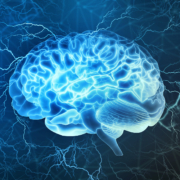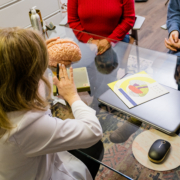The truth about Parkinson’s Disease
Parkinson’s Disease is a brain disorder that causes unintended or uncontrollable movements, such as shaking, stiffness, and difficulty with balance and coordination. For the better part of the last 30 years, Dr. Alexander Troster has been studying this condition to learn more about what causes it, what happens when people have it, and what treatments seem to work best. Today Dr. Troster is professor of neuropsychology and chair of the Department of Neuropsychology at Barrow Neurological Institute at Dignity Health St. Joseph’s Hospital and Medical Center in Phoenix. His current investigations include the assessment, definition, and neural bases of mild cognitive impairment in Parkinson’s disease, and the evaluation and prediction of neurobehavioral outcomes of deep brain stimulation for a variety of neurological and psychiatric conditions. BrainWise Managing Editor Matt Villano recently sat down with Dr. Troster to learn more about his research and his perspective on Parkinson’s Disease. What follows is an edited transcript of their interview.
BrainWise: How is Parkinson’s Disease diagnosed?
Dr. Troster: There is no one diagnostic test for Parkinson’s Disease. One of the things that’s true of Parkinson’s Disease is that the symptoms with which this disease begins is quite variable. If we look at the most common forms, people either begin with having a tremor, which is probably about two thirds of all cases of Parkinson’s disease, and one third who tend to have more difficulty with walking, slowing and stiffness. What’s important to point out is that before Parkinson’s disease is even diagnosed, this is a disease with a long prodromal period. What that means is that the changes in the brain underlying Parkinson’s disease have been occurring for a long, long time. And the estimates are anywhere from 15 to as long as 30 years before diagnosis.
In general, people have difficulties with movement, they’re slower to move. They may shake, especially at rest. But it’s very hard in the individual case to draw a straight line and say, ‘This is going to be the progression, this is the symptom you’re going to have next.’ Symptoms declare themselves slowly, gradually, and with great variability.
One of the things that’s been noticed is that people with Parkinson’s Disease often have depression, even before they get diagnosed with Parkinson’s Disease. They also tend to have something known as REM sleep behavior disorder. During sleep, the muscles are usually paralyzed and then REM sleep behavior disorder, that paralysis doesn’t occur. When people have dreams, they start to act out their dreams, they talk in their sleep, they might start to thrash, they might start falling out of bed. And these are things that one wants to look for. These are all what we call prodromal things. And one of the things that people also have is a loss of smell, which is very common. When you ask people, they often have before the motor symptoms began a loss of smell many years before that.
BrainWise: Do we know what causes Parkinson’s Disease?
Dr. Troster: No, we don’t. I mean, we can talk about how people with Parkinson’s Disease get a misfold of protein that aggregates in the brain cells, then Lewy bodies and Lewy neurites form, but even with that explanation, you can keep on saying, ‘What causes this?’ The truth is that we don’t really know what causes the disease.
Parkinsonism is not the same as Parkinson’s disease. Parkinsonism is the core symptoms involving, for example, tremor, slowness, stiffness, imbalanced difficulties. But those can be produced by literally well over 100 conditions. And some of those are reversible and some are not. Some are just mimics of Parkinson’s disease. This can be frustrating for patients sometimes because they’ll go in and say, ‘I’ve got a tremor,’ and neurologists often are not going to give a diagnosis of Parkinson’s Disease until some of the other symptoms declare themselves and some of the other tests are done.
BrainWise: Is Parkinson’s Disease congenital?
Dr. Troster: If we think genetically, in terms of Mendelian genetics where either one or both parents have the condition, you’re going to get the condition potentially. There are genes associated with it. One is known as LRRK2, leucine-rich kinase repeating, a protein or what’s also called dardarin. And there’s a gene coating for alpha-synuclein, which is the core protein that accumulates and misfolds and forms Lewy bodies. And there’s two types of genes that are both autosomal dominant genes, meaning if one parent has that and you inherit that gene from that parent, that you’re going to get the disease.
What we don’t know at this point is whether there are minor mutations or polymorphisms either individually or in several forms and number can produce something like Parkinson’s Disease. It is likely that some genetic factors might predispose to environmental factors that can then trigger the disease as well. We know environmental factors like exposure to fertilizers, pesticides, well water, for example, can increase risk for Parkinson’s Disease.
BrainWise: What do people often get wrong about Parkinson’s Disease?
Dr. Alexander Troster: I think some of the misconceptions that people held maybe 10, 15 years ago are no longer the misconceptions they hold now generally. I think the biggest things are still a lack of realization that Parkinson’s disease is more than a movement disorder. Most people still think of it as it affects my movement. Some people mistakenly think it paralyzes them. So, I think over the past 10 years, more and more work has been done on the non-motor symptoms in Parkinson’s disease, and I think patients have become aware of non-motor symptoms as the disease has progressed.
Number two is that Parkinson’s is rapidly progressive. It’s much more [dependent on] when one develops the disease and the symptoms that impact the disease course. People with young onset Parkinson’s very often take a long time to progress. Several studies suggest that if you develop things like a dementia or global cognitive impairment, people with young onset Parkinson’s still develop it in their seventies, just like people tend to with regular onset Parkinson’s disease, for want of a better word. So, I’ve seen plenty of patients with Parkinson’s disease for 25 and 30 years.
I think the other misconception is that there’s little one can do. While it’s true that there’s no treatment or even a disease-modifying therapy at this point, a lot of the symptoms can be treated either pharmacologically or by ancillary therapies like speech therapy, physical therapy, occupational therapy. And more recently there’s been much more effort made at trying to study some methods of cognitive rehabilitation and remediation in patients with Parkinson’s disease.
BrainWise: To what extent do cases of Parkinson’s Disease incorporate dementia? Does the former always lead to the latter?
Dr. Troster: To my knowledge there’s only one good longitudinal study and that’s one from Australia, which I think followed people for up to 40 years. And obviously, that shows that pretty much 95 percent of people with Parkinson’s, if you survive that long, are going to develop a dementia. But of course, many people pass away with secondary things, not necessarily Parkinson’s disease, but for example, aspiration pneumonia, heart disease, regular old age. People pass away and never develop dementia. But yes, obviously most people, if they live long enough, will develop dementia. Far more common than previously thought is what’s known as mild cognitive impairment. Some people have called mild cognitive impairment (MCI) as an intermediate state between normal cognition and dementia. There are cases of mild cognitive impairment that are related to factors such as medications, depression, anxiety and so on. So, if you look at studies of Parkinson’s disease with MCI, probably over three-year period, somewhere between five and 10 percent of cases of MCI revert.
BrainWise: How should a person change their lives after receiving a diagnosis of Parkinson’s Disease?
Dr. Troster: One must start looking for new hobbies, new ways to express one’s creativity. I think it’s very important for people to remain socially engaged. People with Parkinson’s Disease sometimes tend to feel stigmatized or become embarrassed by these symptoms. You also see people with Parkinson’s often try to hide it by putting their hand in their pocket or they sit on their hand. Actor Michael J. Fox himself talked about how long he hid it, and I think it took him eight or nine years before he came out and told people that he had Parkinson’s disease.
I think things are less stigmatizing than they were in the past. I think some people’s reactions to mental health conditions often come from a poor understanding of what the condition is and sometimes a fear or a sense of threat that one may suffer a similar fate. But persons with Parkinson’s Disease are very adapt. We’ve looked at coping strategies. They use coping strategies just like healthy people. They’re quite capable of adapting to the disease, the diagnosis, of keeping on going. Many people with Parkinson’s disease continue to work, they continue to find pleasure in social activities.
I cannot overemphasize, quality of life can be very good in Parkinson’s disease for a long time, despite these changes. And I think people have to hear that.
BrainWise: Once someone is diagnosed with Parkinson’s Disease, is there a uniform course of symptoms?
Dr. Troster: Not really. Not everybody has cognitive impairment—again, look at Michael J. Fox. Cognitive impairment and MCI tend to be especially rare in young onset. Some patients also react differently to medications, develop dyskinesias, or erratic movements, in response to medications sooner, which is unusual. But there are alternative therapies available too, such as deep-brain stimulation.
BrainWise: What is deep-brain stimulation and how can it help?
Dr. Troster: Surgical treatment is usually way down in the armamentarium of treatments. It’s not the first thing one considers. It’s usually when people have side effects from medications or intolerable side effects from them, or the diseases become less responsive, some of the symptoms, or they have complications as they’re from the treatment like dyskinesias or they can’t tolerate doses of medication. Then it’s a good time to consider alternative therapies. Deep-brain stimulation (DBS) is one of those alternatives.
It’s been around 30 years now. The devices have become much smaller, much more sophisticated, so you can steer currents to very small parts of the brain and shape the electrical field with which you’re stimulating the brain. With DBS it becomes easier to control specific symptoms and avoid side effects with the therapy. These devices last [a relatively long time]. Some people choose to have devices with batteries in them that need to be replaced every few years. Some people prefer a rechargeable device, so they don’t have to worry about replacing a battery. Again, it’s not a first line therapy, but it’s a therapy down the road for people who have complications or an unusual course if they’re young and develop some of these symptoms early.
BrainWise: How does this treatment work?
Dr. Troster: It’s pretty much like a pacemaker. The treatment is ongoing, it’s continuous. The device needs to be programmed by a neurologist and the programming tends to take a little more time initially. You’ll have more visits with your neurologist immediately after surgery, probably every four weeks or every two months. Once it’s programmed, you’re probably going to see your neurologist just like every other patient, probably every six to 12 months. The therapeutic benefit lasts a long time. Typically, what people tell you is that the very best you are with medicine is probably the very best you’re going to be with the device. It evens out the effect, so you don’t have the fluctuations. If somebody’s got balance problems or gait disturbance because of balance problems, it’s not going to help for that. It’s not a therapy for everything. People ask whether a person with Parkinson’s disease a candidate for surgery, and I’ve always preferred to turn it the other way around and say, ‘Is this an appropriate therapy for the person with Parkinson’s disease?’
Patients also are very different in their risk tolerance. I’ve seen persons where they see the neurologist and the neurologist says, ‘Well, you’ll have some benefit from DBS.’ And the person says, ‘I don’t care. I want surgery anyway.’ In one example I’ll remember forever, a patient told me, ‘I don’t care. I’m retired. All I want to be able to do is tee up the golf ball.’ My response: ‘Well, who knows,’ sort of jokingly. ‘If it affects your memory, your golf score will get better too because you won’t remember the number of strokes you’ve taken.’
BrainWise: What does the future of Parkinson’s Disease treatment look like?
Dr. Troster: Let me get out the crystal ball here. There’s an amazing amount of research going on in therapies, in terms of molecular biology, genetics, gene therapy, medications, and identifying what causes some of the misfolding of protein. As you know, some advances have lately been made with medications for Alzheimer’s disease. Will there be a similar thing for Parkinson’s disease? One hopes so. I think ancillary therapies are going to continue to get better. [Researchers] have never looked at cognitive rehabilitation in Parkinson’s disease, but now there are people looking at that. [Researchers] also are looking at transcranial stimulation, be that direct current, alternating current or magnetic stimulation. And what’s exciting to some extent is there’s some findings from studies in Italy that suggest with [this treatment] you might make persons more receptive when you do cognitive rehabilitation.
[Other researchers] are trying to find biomarkers. I think that’s one of the things that’s going to be imperative. If we can find these biomarkers and put them together with other markers, we can predict what the course of the disease is going to be. Then we can determine what treatment needs to be given. I think in future, maybe five or 10 years from now, doctors are going to say, ‘We need to treat you fairly aggressively; this is going to be a progressive quick form of Parkinson’s,’ or, ‘This is going to be relatively benign. You’re going to develop this at that stage, and we’ll treat you at that time for this [one] symptom.’ So I think with treatment tailored for individual symptoms rather than trying to hit all symptoms with one drug or two drugs, that will be the way things go down the road.
BrainWise: Finally, Dr. Troster, what’s the next big research question for you?
Dr. Troster: The big question is, ‘Can we predict who’s going to develop dementia with Parkinson’s disease and how quickly?’ Because these are the folks we really want to spend more time on. We want to repair families, make these changes earlier, and hopefully predict these things sooner. And I’m not hopeful that our neuropsychological tests are necessarily the best for this right now. About 25 years ago, when I started focusing on this, a Parkinson’s Disease expert who will remain nameless said to me, ‘Why are you doing neuropsychology in Parkinson’s disease? It’s a movement disorder.’ That’s a big [hurdle to overcome.]
Non-motor symptoms are the big challenge in Parkinson’s Disease today. These are things that lead to caregiver burden. These are the things that lead to institutionalization, and loss of independence. I think we’ve made huge strides in the last 10 years. I think we also have a long way to go. We’ve come to realize a lot of what some of the issues are, whether they’re impulsive and compulsive behaviors that people can develop, cognitive changes, depression, anxiety, psychosis, other non-motor features, like some patients develop pain, sleep disturbances. How do we cope with those? How do we best treat those? And I think we’ve come to recognize them at least, and able to diagnose them a little better. Now what we have to do is get better treatments for these things.









